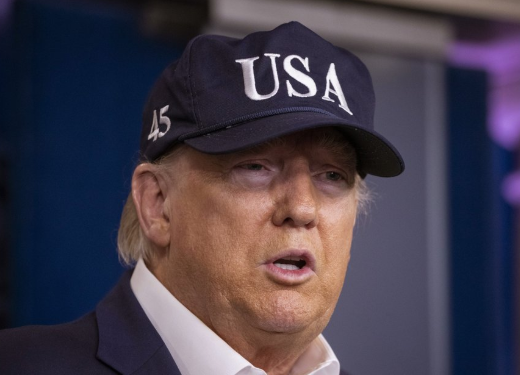
President Donald Trump speaks during a news conference about the coronavirus in the James Brady Briefing Room at the White House, Saturday, March 14, 2020, in Washington. (Photo: AP)
President Donald Trump announced Saturday that the United States will broaden its European travel ban, adding Britain and Ireland to its list, and was considering imposing restrictions on travel within the US to areas hit hard by the coronavirus spread.
Under the restrictions on European travel, American citizens, green card holders and others are still allowed to return home to the US, but will be funneled to 13 airports and be subjected to health screenings and quarantine orders.
“If you don’t have to travel, I wouldn’t do it,” Trump said. After days of reluctance, he also said he had taken the coronavirus test following several interactions with people who are infected. The White House began testing the temperatures of everyone who’s been close to Trump; he said his own temperature was normal and he was feeling fine.
Early Saturday the House approved legislation to provide direct relief to Americans suffering physically, financially and emotionally from the coronavirus pandemic. The Senate still must vote on the package. Trump has thrown his support behind it.
On Friday, Trump declared a national emergency, unleashing as much as $50 billion for state and local governments to respond to the crisis.
The new travel restrictions come as Britain has seen its death toll from the virus nearly double from the day before to 21, and the number of people infected rise to over 1,100 from about 800 the previous day. Ireland had 90 confirmed cases and one death by Friday. The Irish government hasn’t released any updated figures since.
The US said earlier in the week a 30-day ban on flights covered only the 26-nation Schengen area, the European Union’s border-free travel zone, which excludes Britain and Ireland. Vice President Mike Pence said the restrictions on Britain and Ireland would go into effect midnight on Monday night.
Pence added that administration officials were “considering a broad range of measures” for potential domestic travel restrictions but no decisions have been made.
“We’re going to continue to follow the facts,” Pence said. “We’re going to continue to listen to the experts about recommendations.”
Britain has taken a different approach as countries across Europe and around the shut schools and universities, scrap sports tournaments and shutter bars and restaurants. The British government hasn’t yet restricted everyday activities of residents by banning large public gatherings or suspending transit networks. However, domestic media outlets reported on Saturday that authorities were considering banning gatherings of 500 or more people as early as next weekend.
Britain’s strategy is based on the presumption that most people in the country will eventually get the virus, and severe measures to contain it are unlikely to work. Patrick Vallance, the British government’s chief scientific adviser, has said the UK was “about four weeks or so behind Italy,” where more than 15,000 infections and more than 1,000 deaths were recorded in only three weeks.
Schools in Northern Ireland were operating as usual but across the border in the Irish Republic, schools, colleges, daycare centers and cultural institutions were closed.
Senate Majority Leader Mitch McConnell canceled the coming week’s planned recess and expects swift action on the package. But top Senate Democrats called on McConnell to reconvene now and pass the aid package.
Trump also announced a range of executive actions, including a new public-private partnership to expand coronavirus testing capabilities with drive-through locations, as Washington tries to subdue the virus whose spread is roiling markets, shuttering institutions and disrupting the lives of everyday Americans.


